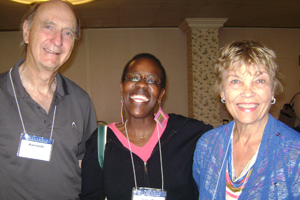Latest News Archive
Please select Category, Year, and then Month to display items
06 November 2023
|
Story MBALI MABOEA
|
Photo SUPPLIED
 The Department of Geography on the UFS Qwaqwa Campus recently played host to the Society of South African Geographers Conference (SSAG 2023), which gathered more than 100 students over three days.
The Department of Geography on the UFS Qwaqwa Campus recently played host to the Society of South African Geographers Conference (SSAG 2023), which gathered more than 100 students over three days.
Fostering academic growth, collaboration, and inspiration among students and researchers in the field of geography, the Department of Geography on the UFS Qwaqwa Campus recently played host to the Society of South African Geographers Conference (SSAG 2023), which gathered more than 100 students over three days.
Following a five-year hiatus, the three-day conference comprised student proposal presentations in different fields: human geography, environment geography, geoinformatics, and physical geography, divided into breakaway sessions over two days. Furthermore, day three of the annual conference included an excursion to the Basotho Cultural Village and Clarens.
The three-day annual student conference focused on different themes presented by two main speakers. The topic of the first keynote speaker, Dr Mahlomola Daemane, General Manager of the SANParks Arid Research Unit, focused on the contemporary conservation, transition, and relevance of science in policy and decision making.
The second keynote speaker was Dr Felicia Akinyemi, a Marie Sklodowska-Curie Research Fellow affiliated with the Institute of Geography at the University of Bern in Switzerland. Her work focuses on the intersection of geoinformatics, global change, and sustainability. Dr Akinyemi focused her talk on the integrative geospatial methods and metrics for sustainable land use. She introduced different techniques and metrics and gave students insight in early-career African research.
Speaking about the success of the conference, Nthebohiseng Sekhele, Geography Lecturer on the Qwaqwa Campus and chair of the organising committee, said, “The local organising committee was also very impressed with the quality of presentations from our postgraduate students in Geography, as well as the robust discussions that happened during the parallel sessions in the two days of the conference. We had a positive response of physical and online participation from many universities across South Africa. We are pleased that we have achieved our goal with this conference, which is to inspire the next generation of geographers.”
The practice of mourning loss
2014-06-11

Prof Kenneth Gergen, Dr Jennifer Githaiga and Prof Mary Gergen
Photo: Supplied |
Among international delegates from over 60 nations and more than 1 300 participants, Dr Jennifer Githaiga presented her paper on the practice of mourning – the African way.
Her paper questioned the language used in psychology to ‘pathologise’ African people’s mourning practices. Drawing from her doctoral research, she explained the role of maintaining close bonds with family members after they pass away. Rather than severing these bonds, Dr Githaiga argued that continued attachment beyond death plays a significant role in healing the trauma of loss.
Dr Githaiga’s entitled her paper ‘The “pathology” of post-bereavement bonds: cultural positioning in qualitative inquiry.’ She presented this at the Tenth International Congress of Qualitative Inquiry (ICQI). A conference that has become one of the most important events on the calendar of qualitative researchers across the globe. The event was hosted at the University of Illinois in Urbana-Champaign from 21 - 24 May 2014. The theme of the conference this year was ‘Qualitative Inquiry and the Politics of Research’.
Dr Githaiga is currently a postdoctoral fellow at Trauma, Forgiveness and Reconciliation Studies at the UFS. During the congress, she also found herself in the role as ambassador to Kovsies. Not only did she rub shoulders with highly-regarded Profs Kenneth and Mary Gergen, but also spoke with leading scholars in the field of qualitative research interested in our university.